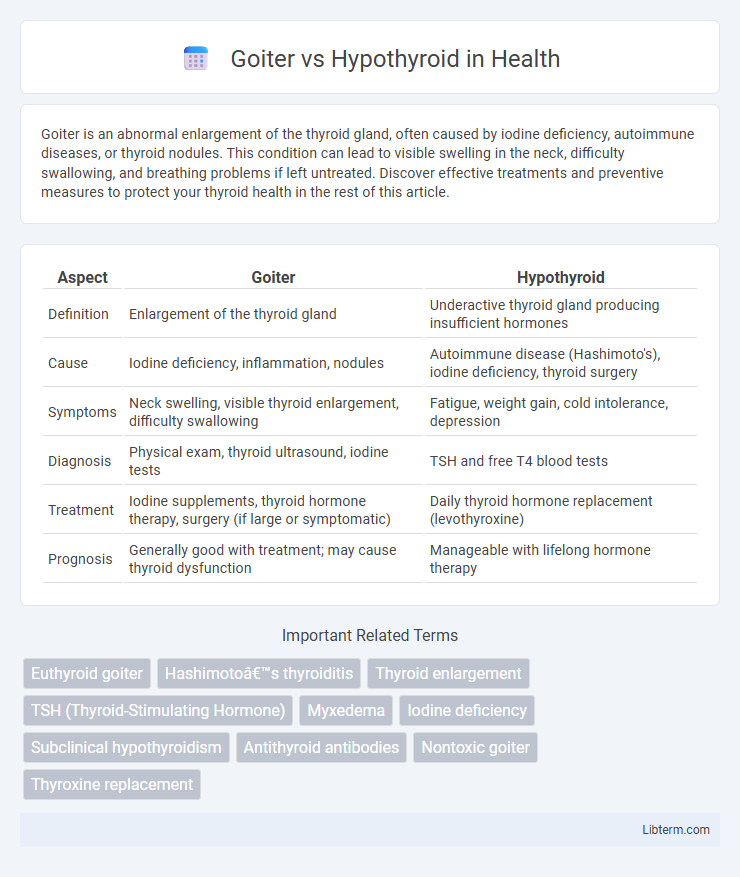Goiter is an abnormal enlargement of the thyroid gland, often caused by iodine deficiency, autoimmune diseases, or thyroid nodules. This condition can lead to visible swelling in the neck, difficulty swallowing, and breathing problems if left untreated. Discover effective treatments and preventive measures to protect your thyroid health in the rest of this article.
Table of Comparison
| Aspect | Goiter | Hypothyroid |
|---|---|---|
| Definition | Enlargement of the thyroid gland | Underactive thyroid gland producing insufficient hormones |
| Cause | Iodine deficiency, inflammation, nodules | Autoimmune disease (Hashimoto's), iodine deficiency, thyroid surgery |
| Symptoms | Neck swelling, visible thyroid enlargement, difficulty swallowing | Fatigue, weight gain, cold intolerance, depression |
| Diagnosis | Physical exam, thyroid ultrasound, iodine tests | TSH and free T4 blood tests |
| Treatment | Iodine supplements, thyroid hormone therapy, surgery (if large or symptomatic) | Daily thyroid hormone replacement (levothyroxine) |
| Prognosis | Generally good with treatment; may cause thyroid dysfunction | Manageable with lifelong hormone therapy |
Understanding Goiter: Definition and Causes
Goiter is an abnormal enlargement of the thyroid gland, often caused by iodine deficiency, autoimmune diseases like Hashimoto's thyroiditis, or thyroid nodules. It can occur with normal, decreased, or increased thyroid hormone levels, distinguishing it from hypothyroidism, which specifically involves insufficient thyroid hormone production. Understanding the causes of goiter is crucial for accurate diagnosis and effective treatment of thyroid-related disorders.
What is Hypothyroidism? Overview and Triggers
Hypothyroidism is a condition where the thyroid gland produces insufficient hormones, leading to slowed metabolism and symptoms like fatigue, weight gain, and cold intolerance. Common triggers include iodine deficiency, autoimmune diseases such as Hashimoto's thyroiditis, certain medications, and thyroid surgery. Unlike goiter, which is an enlargement of the thyroid gland visible as swelling in the neck, hypothyroidism specifically refers to the underactive function of the gland rather than its size.
Key Differences Between Goiter and Hypothyroidism
Goiter is characterized by an abnormal enlargement of the thyroid gland, visible as a swelling in the neck, while hypothyroidism is a thyroid hormone deficiency causing metabolic slowdown. Goiter can occur with normal, increased, or decreased thyroid function, whereas hypothyroidism specifically involves low thyroid hormone production. The primary diagnostic difference lies in thyroid hormone levels: goiter diagnosis focuses on gland size and imaging, while hypothyroidism is confirmed through blood tests showing elevated TSH and decreased T3/T4 levels.
Symptoms Comparison: Goiter vs Hypothyroidism
Goiter presents primarily as a visible swelling in the neck due to thyroid gland enlargement, often without immediate symptoms affecting hormone levels. Hypothyroidism is characterized by symptoms such as fatigue, weight gain, cold intolerance, and depression, reflecting decreased thyroid hormone production. While a goiter may or may not cause hypothyroid symptoms, hypothyroidism specifically arises from insufficient thyroid hormones, leading to systemic metabolic slowdown.
Risk Factors for Developing Goiter and Hypothyroidism
Iodine deficiency remains the leading risk factor for goiter, particularly in regions with low dietary iodine intake, while autoimmune disorders such as Hashimoto's thyroiditis predominantly contribute to hypothyroidism development. Exposure to radiation, certain medications like lithium, and a family history of thyroid disease further increase susceptibility to both conditions. Women, especially during pregnancy or menopause, face higher risks, with age and environmental factors also influencing the incidence of goiter and hypothyroidism.
Diagnosis: How Are Goiter and Hypothyroidism Identified?
Goiter is typically identified through physical examination revealing an enlarged thyroid gland, while hypothyroidism diagnosis involves blood tests measuring thyroid hormone levels, such as TSH and free T4. Ultrasound imaging assists in evaluating thyroid size and nodules in goiter cases, providing detailed structural information. Hypothyroidism is confirmed by elevated TSH and low free T4 levels, distinguishing it from other thyroid disorders.
Treatment Options for Goiter
Treatment options for goiter depend on its cause, size, and symptoms, with iodine supplementation being effective for iodine-deficiency goiters. In cases of autoimmune thyroid disease such as Hashimoto's thyroiditis, thyroid hormone replacement therapy like levothyroxine helps reduce goiter size and manage hypothyroidism. Surgical removal or radioactive iodine therapy may be necessary for large, symptomatic, or suspicious goiters unresponsive to medical treatment.
Managing Hypothyroidism: Therapies and Lifestyle
Managing hypothyroidism involves consistent thyroid hormone replacement therapy, primarily using levothyroxine to normalize TSH levels and alleviate symptoms. Lifestyle adjustments such as a balanced diet rich in iodine, selenium, and zinc, regular exercise, and stress management support thyroid health and improve treatment outcomes. Regular monitoring of thyroid function tests ensures optimal dosing, preventing complications linked to untreated or poorly managed hypothyroidism.
Prevention Tips: Reducing Risk of Thyroid Disorders
Regular iodine intake through iodized salt and seafood helps prevent goiter and hypothyroid conditions by supporting thyroid hormone production. Routine thyroid function tests enable early detection of thyroid imbalances, allowing timely intervention to reduce disease progression. Avoiding exposure to environmental toxins such as excessive fluoride and radiation lowers the risk of thyroid gland dysfunction and related disorders.
When to Seek Medical Attention for Thyroid Issues
Seek medical attention for thyroid issues if you notice a visible swelling in the neck, difficulty swallowing, persistent fatigue, unexplained weight changes, or irregular heartbeats, as these symptoms may indicate goiter or hypothyroidism. Early diagnosis through blood tests measuring thyroid hormone levels (TSH, T3, T4) and imaging helps prevent complications like heart problems or infertility. Prompt treatment with thyroid hormone replacement or other medical interventions ensures effective management of both goiter and hypothyroidism.
Goiter Infographic

 libterm.com
libterm.com